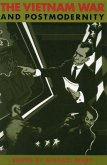Throughout the last decade, defenders of the US role in Vietnam have argued that America's defeat was not the result of an illegitimate intervention or military shortcomings but rather a failure of will because national leaders, principally Lyndon B. Johnson, forced the troops to 'fight with one hand tied behind their backs.' In this volume, Robert Buzzanco disproves this theory by demonstrating that political leaders, not the military brass, pressed for war; that American policymakers always understood the problems and peril of war in Indochina; and that civil-military acrimony and the political desire to defer responsibility for Vietnam helped lead the United States into the war. For the first time, these crucial issues of military dissent, interservice rivalries, and civil-military relations and politics have been tied together to provide a cogent and comprehensive analysis of the US role in Vietnam.
Table of contents:
1. Introduction; 2. Prologue to tragedy: US military opposition to intervention in Vietnam, 1950-1954; 3. Preparing for and avoiding war: military affairs and politics in Vietnam and the United States, 1955-1960; 4. Pinning down the president: JFK, the military, and political manoeuvering over Vietnam, January-October 1961; 5. The best and worst of times: the US war against Vietnam, October 1961-November 1963; 6. 'Seeing things through Vietnam': LBJ, the military, and the growing U.S. commitment to Vietnam, November 1963-December 1964; 7. Hope for the best, expect the worst: US ground troops enter the war in Vietnam, January-July 1965; 8. War on three fronts: US forces vs. the VC, Westmoreland vs. the marine, and the military leaders vs. the White House, July 1965-December 1966; 9. 'The platform of false prophets is crowded': public hope and private despair in Vietnam, 1967; 10. The myth of the Tet: military failure and the politics of war; 11. Conclusion: bringing it all back home; Epilogue; Notes; Bibliography.
This volume convincingly disproves the claim that America's defeat in Vietnam was the result of a failure of will because national leaders, principally Lyndon B. Johnson, forced the troops to 'fight with one hand tied behind their backs.'
This volume convincingly disproves the 'fighting with one hand tied behind our backs' explanation of America's defeat in Vietnam.
Hinweis: Dieser Artikel kann nur an eine deutsche Lieferadresse ausgeliefert werden.
Table of contents:
1. Introduction; 2. Prologue to tragedy: US military opposition to intervention in Vietnam, 1950-1954; 3. Preparing for and avoiding war: military affairs and politics in Vietnam and the United States, 1955-1960; 4. Pinning down the president: JFK, the military, and political manoeuvering over Vietnam, January-October 1961; 5. The best and worst of times: the US war against Vietnam, October 1961-November 1963; 6. 'Seeing things through Vietnam': LBJ, the military, and the growing U.S. commitment to Vietnam, November 1963-December 1964; 7. Hope for the best, expect the worst: US ground troops enter the war in Vietnam, January-July 1965; 8. War on three fronts: US forces vs. the VC, Westmoreland vs. the marine, and the military leaders vs. the White House, July 1965-December 1966; 9. 'The platform of false prophets is crowded': public hope and private despair in Vietnam, 1967; 10. The myth of the Tet: military failure and the politics of war; 11. Conclusion: bringing it all back home; Epilogue; Notes; Bibliography.
This volume convincingly disproves the claim that America's defeat in Vietnam was the result of a failure of will because national leaders, principally Lyndon B. Johnson, forced the troops to 'fight with one hand tied behind their backs.'
This volume convincingly disproves the 'fighting with one hand tied behind our backs' explanation of America's defeat in Vietnam.
Hinweis: Dieser Artikel kann nur an eine deutsche Lieferadresse ausgeliefert werden.








